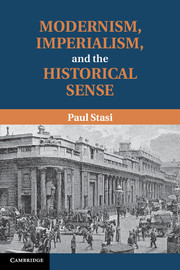Description
Modernism, Imperialism and the Historical Sense
Author: Stasi Paul
This book provides a re-reading of canonical modernism, connecting it to imperialism without conflating it with imperialist practices.
Language: English
Publication date: 07-2012
194 p. · 15.9x23.5 cm · Hardback
194 p. · 15.9x23.5 cm · Hardback
Description
/li>Contents
/li>Biography
/li>
Modernist art and literature sought to engage with the ideas of different cultures without eradicating the differences between them. In Modernism, Imperialism and the Historical Sense, Paul Stasi explores the relationship between high modernist aesthetic forms and structures of empire in the twentieth century. Stasi's text offers new readings of James Joyce, Ezra Pound, T. S. Eliot and Virginia Woolf by situating their work within an early moment of globalization. By combining the insights of Marxist historiography, aesthetic theory and postcolonial criticism, Stasi's careful analysis reveals how these authors' aesthetic forms responded to, and helped shape, their unique historical moment. Written with a wide readership in mind, this book will appeal especially to scholars of British and American literature as well as students of literary criticism and postcolonial studies.
Acknowledgments; Introduction: imperial structures of feeling; 1. The persistence of the past: modernism vs. imperial time; 2. The Waste Land and the unreal center of capitalist modernity; 3. Cosmopolitan kulchur: The Cantos as world literature; 4. Turning production into consumption: Ulysses and the construction of postcolonial agency; 5. 'Moments of pride in England': Virginia Woolf and the forms of national subjectivity; Coda: the Edwardian lumber room; Notes.
Paul Stasi received his PhD from the University of California, Berkeley in 2006. He writes on twentieth-century Anglophone literature and has published articles on T. S. Eliot, James Joyce, Ezra Pound, Richard Flannagan and Jean Toomer. He currently teaches at the University of Albany.
© 2024 LAVOISIER S.A.S.





